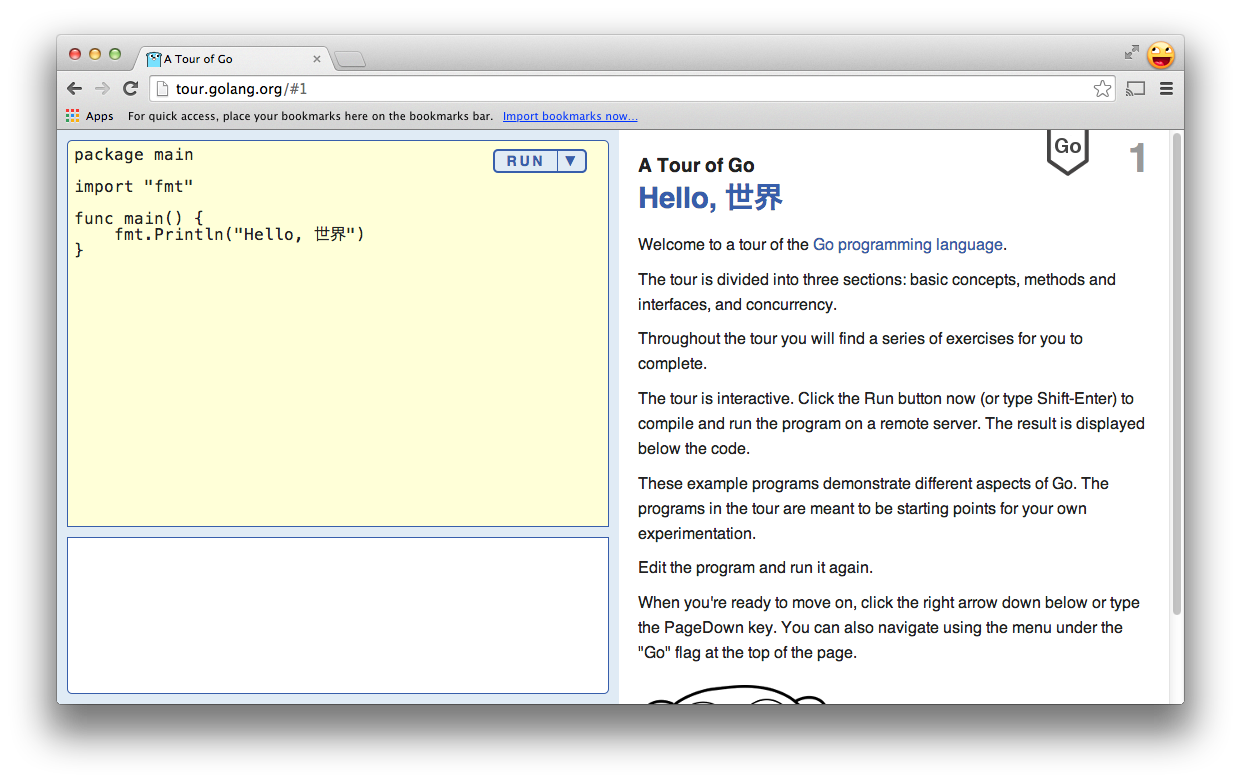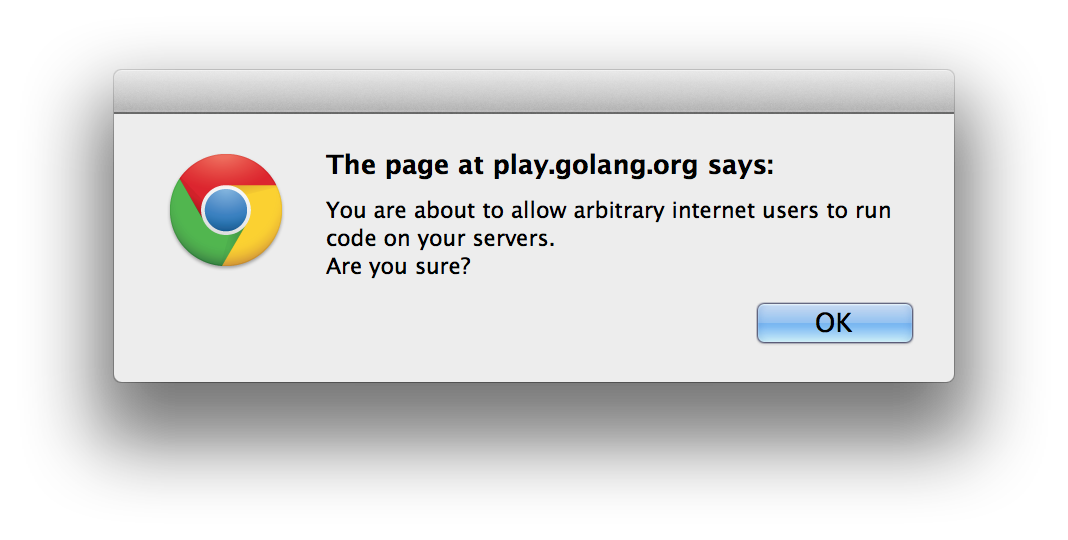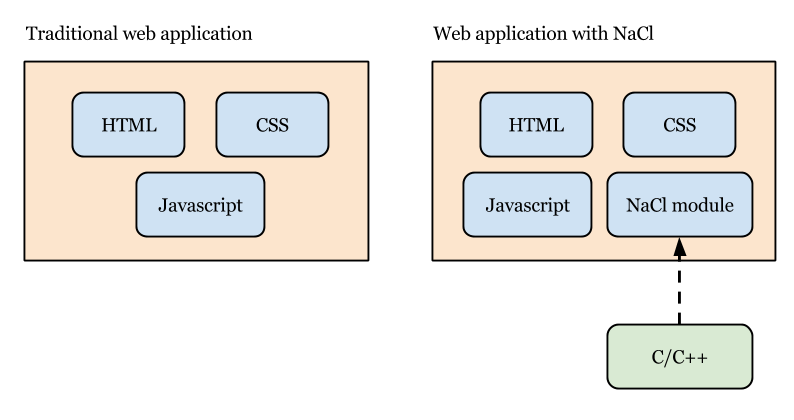Inside the Go playground
Francesc Campoy Flores
Developer Advocate, Gopher
Francesc Campoy Flores
Developer Advocate, Gopher





package main import "fmt" func main() { fmt.Println("Hello, gophers!") }
These slides are driven by the present Go tool
go get code.google.com/go.tools/cmd/present

Let's start with something simple

stack overflow
package main func foo(a [1000]byte) { foo(a) } func main() { foo([1000]byte{}) }
The runtime catches the error and panics.
14
out of memory
package main type list struct { buf [100000]byte next *list } func main() { var l *list for { l = &list{next: l} } }
Again the runtime catches the error and panics.
15package main func main() { for { } }
package main import ( "fmt" "time" ) func main() { fmt.Println("Good night") time.Sleep(8 * time.Hour) fmt.Println("Good morning") }
A sleeping program still consumes resources.
Easy way of having a Denial of Service attack.
17User code shouldn't be able to modify the backend's file system.
// +build ignore,OMIT
package main
import (
"log"
"os"
)
func main() { err := os.RemoveAll("/foo") if err != nil { log.Fatal(err) } }
// +build ignore,OMIT
package main
import (
"encoding/json"
"fmt"
"log"
"net/http"
)
func main() { res, err := http.Get("http://api.openweathermap.org/data/2.5/weather?q=Portland") if err != nil { log.Fatal(err) } defer res.Body.Close() var w struct { Weather []struct { Desc string `json:"description"` } `json:"weather"` } if err := json.NewDecoder(res.Body).Decode(&w); err != nil { log.Fatal(err) } fmt.Printf("No need to rush outside, we have %v.", w.Weather[0].Desc) }

Default limits are not safe enough.
ulimit could solve this.
-d maximum size of data segment or heap (in kbytes) -s maximum size of stack segment (in kbytes) -t maximum CPU time (in seconds) -v maximum size of virtual memory (in kbytes)
Originally designed to execute native code in Chrome safely.
NaCl defines restrictions on the binaries being executed.
The code runs in a sandbox isolated from the underlying OS.

We use NaCl to:
Process can only write to stdout/stderr.
25"No sleeping in the playground."
Custom runtime with a fake time package.
func Sleep(d time.Duration) {
panic("No sleeping in the playground")
}
The syscall package is the only link between user code and the OS kernel.
The playground runtime has a custom syscall package.
File system operations operate on a fake in-memory file system.
// +build ignore,OMIT
package main
import (
"fmt"
"io/ioutil"
"log"
)
func main() { const filename = "/tmp/file.txt" err := ioutil.WriteFile(filename, []byte("Hello, file system\n"), 0644) if err != nil { log.Fatal(err) } b, err := ioutil.ReadFile(filename) if err != nil { log.Fatal(err) } fmt.Printf("%s", b) }
All network operations also use the syscall package.
The network stack is also faked in-memory.
// +build ignore,OMIT
package main
import (
"io"
"log"
"net"
"os"
)
func main() { l, err := net.Listen("tcp", "127.0.0.1:4000") if err != nil { log.Fatal(err) } defer l.Close() go dial() c, err := l.Accept() if err != nil { log.Fatal(err) } defer c.Close() io.Copy(os.Stdout, c) }
func dial() {
c, err := net.Dial("tcp", "127.0.0.1:4000")
if err != nil {
log.Fatal(err)
}
defer c.Close()
c.Write([]byte("Hello, network\n"))
}
// +build ignore,OMIT
package main
import (
"io"
"log"
"net"
"os"
)
func main() {
l, err := net.Listen("tcp", "127.0.0.1:4000")
if err != nil {
log.Fatal(err)
}
defer l.Close()
go dial()
c, err := l.Accept()
if err != nil {
log.Fatal(err)
}
defer c.Close()
io.Copy(os.Stdout, c)
}
func dial() { c, err := net.Dial("tcp", "127.0.0.1:4000") if err != nil { log.Fatal(err) } defer c.Close() c.Write([]byte("Hello, network\n")) }
Go is about concurrency.
We need to demonstrate concurrency in blog posts and talks.
And demonstrating concurrency without time is hard.


There's a special goroutine managing timers T.
A goroutine G calls time.Sleep:
1. G adds a timer to the timer heap.
2. G puts itself to sleep.
3. T tells the OS to wake it when the next timer expires and puts itself to sleep.
4. When T is woken up it looks at the timer on the top of the heap, and wakes the corresponding goroutine.
package main func main() { c := make(chan int) <-c }
Many flavors of deadlocks.
One common property: all goroutines are asleep.
35
A goroutine G calls time.Sleep:
1. G adds a timer to the timer heap.
2. G puts itself to sleep.
3. The scheduler detects a deadlock, checks the timer heap for pending timers.
4. The internal clock is advanced to the next timer expiration.
5. The corresponding goroutines are woken up.
36Faking time allows precise sleep durations.
package main import ( "fmt" "time" ) func main() { start := time.Now() fmt.Println(start) for i := 0; i < 10; i++ { time.Sleep(time.Nanosecond) fmt.Println(time.Since(start)) } }
The playground's write syscall inserts a timestamp before each write.
The front end translates that into a series of "events" that the browser can play back.
// +build ignore,OMIT
package main
import (
"fmt"
"time"
)
func main() { fmt.Println("Good night") time.Sleep(8 * time.Hour) fmt.Println("Good morning") }
Returns directly
{
"Errors":"",
"Events":[
{"Message":"Good night\n","Delay":0},
{"Message":"Good morning\n","Delay":28800000000000}
]
}



These slides: /talks/2014/playground.slide
More about the Go tour:
More about Go on NaCl: